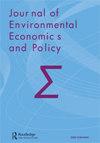The employment double dividend of environmental tax reforms: exploring the role of agent behaviour and social interaction
IF 1.2
Q3 ENVIRONMENTAL STUDIES
Journal of Environmental Economics and Policy
Pub Date : 2020-09-15
DOI:10.1080/21606544.2020.1819433
引用次数: 4
Abstract
ABSTRACT It has been long debated whether environmental tax reform (ETR), i.e. a revenue-neutral shift of the tax burden from labour to carbon emissions, can have a double dividend, in terms of climate and economic goals. So far this question has been addressed in public finance and environmental economics using models with rational and representative agents. Here we examine the relevance of deviating from these standard behavioural assumptions. Our motivation is that research from other fields indicates that impacts of both environmental and income taxation on households are sensitive to behavioural biases, such as habits, imitation or status seeking. A related feature is that consumers and firms are heterogeneous with respect to many characteristics, some of which are crucial for the distributional effects of a tax reform. We combine insights from social psychology and behavioural, evolutionary and labour economics to identify behavioural cases in which the impacts of an ETR is likely to differ significantly from those in the traditional framework. Our findings show that households’ time use patterns and the distinction between extensive and intensive labour supply are relevant and deserve more attention.环境税改革的就业双重红利:代理人行为与社会互动的作用探析
摘要长期以来,人们一直在争论环境税改革(ETR)是否能在气候和经济目标方面产生双重红利,即税收负担从劳动力向碳排放的收入中性转变。到目前为止,这个问题已经在公共财政和环境经济学中使用具有理性和代表性代理人的模型来解决。在这里,我们研究偏离这些标准行为假设的相关性。我们的动机是,其他领域的研究表明,环境税和所得税对家庭的影响对行为偏见很敏感,如习惯、模仿或地位追求。一个相关的特征是,消费者和企业在许多特征方面是异质的,其中一些特征对税收改革的分配效果至关重要。我们结合了社会心理学和行为、进化和劳动经济学的见解,以确定ETR的影响可能与传统框架中的影响显著不同的行为案例。我们的研究结果表明,家庭的时间使用模式以及广泛和密集劳动力供应之间的区别是相关的,值得更多关注。
本文章由计算机程序翻译,如有差异,请以英文原文为准。
求助全文
约1分钟内获得全文
求助全文
来源期刊

Journal of Environmental Economics and Policy
ENVIRONMENTAL STUDIES-
CiteScore
4.70
自引率
7.70%
发文量
26
 求助内容:
求助内容: 应助结果提醒方式:
应助结果提醒方式:


